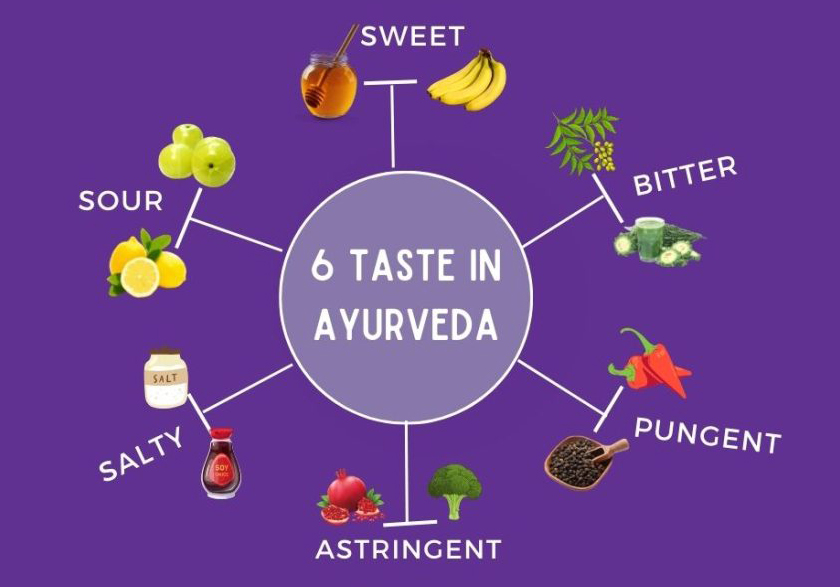Ayurveda, the ancient Indian system of medicine, emphasizes the importance of taste, or “Rasa,” in maintaining health and harmony within the body and mind. According to Ayurveda, there are six fundamental tastes—Sweet (Madhura), Sour (Amla), Salty (Lavana), Bitter (Tikta), Pungent (Katu), and Astringent (Kashaya). Each taste has unique qualities and effects on the body, influencing our physical health, emotions, and Doshas (the three bio-energies: Vata, Pitta, and Kapha).
Understanding the six tastes and how they interact with our body can help us make mindful dietary choices that promote balance, prevent disease, and enhance overall well-being.
1. Sweet (Madhura)
- Qualities: Cool, heavy, moist.
- Effect on Doshas: Pacifies Vata and Pitta, increases Kapha.
- Sources: Grains (like rice and wheat), dairy products, fruits (such as bananas, mangoes, and dates), sweet vegetables (like sweet potatoes and carrots), natural sugars (like honey and jaggery), and certain herbs (like licorice and fennel).
Role in the Body: The sweet taste is grounding, nourishing, and soothing. It promotes growth and strength, supports healthy tissues, enhances immunity, and provides satisfaction. Sweet taste is particularly beneficial for calming Vata and Pitta Doshas, but when consumed in excess, it can lead to weight gain, congestion, and an increase in Kapha Dosha.
2. Sour (Amla)
- Qualities: Warm, light, oily.
- Effect on Doshas: Pacifies Vata, increases Pitta and Kapha.
- Sources: Citrus fruits (like lemons and oranges), fermented foods (like yogurt and pickles), tamarind, tomatoes, and certain herbs (like hibiscus and amla).
Role in the Body: The sour taste stimulates digestion, awakens the senses, and sharpens the appetite. It promotes the secretion of digestive enzymes and aids in the absorption of nutrients. Sour taste can help balance Vata Dosha but should be consumed in moderation by individuals with dominant Pitta and Kapha, as it can increase acidity, inflammation, and congestion.
3. Salty (Lavana)
- Qualities: Warm, heavy, moist.
- Effect on Doshas: Pacifies Vata, increases Pitta and Kapha.
- Sources: Sea salt, rock salt, soy sauce, and salty foods like seaweed and pickles.
Role in the Body: The salty taste enhances flavor, stimulates digestion, and supports electrolyte balance in the body. It helps in detoxification, maintains fluid balance, and improves the absorption of nutrients. However, excessive salt intake can aggravate Pitta and Kapha Doshas, leading to high blood pressure, water retention, and skin issues.
4. Bitter (Tikta)
- Qualities: Cool, light, dry.
- Effect on Doshas: Pacifies Pitta and Kapha, increases Vata.
- Sources: Green leafy vegetables (like kale, spinach, and fenugreek), bitter melon, turmeric, neem, dandelion, and herbs like aloe vera and goldenseal.
Role in the Body: The bitter taste is detoxifying, purifying, and cooling. It helps cleanse the body of toxins, reduces excess heat, and supports liver function. Bitter foods stimulate digestion and reduce cravings for sweets. While beneficial for Pitta and Kapha, the bitter taste can aggravate Vata Dosha if consumed in excess, leading to dryness, anxiety, and digestive issues.
5. Pungent (Katu)
- Qualities: Hot, dry, light.
- Effect on Doshas: Pacifies Kapha, increases Vata and Pitta.
- Sources: Spices (like black pepper, ginger, garlic, cayenne, and mustard), onions, radishes, and chilies.
Role in the Body: The pungent taste is stimulating, warming, and energizing. It enhances metabolism, clears congestion, improves circulation, and sharpens the mind. Pungent foods help balance Kapha Dosha, making them useful in combating colds, congestion, and lethargy. However, excessive pungent taste can aggravate Pitta and Vata, leading to inflammation, irritability, and digestive discomfort.
6. Astringent (Kashaya)
- Qualities: Cool, dry, heavy.
- Effect on Doshas: Pacifies Pitta and Kapha, increases Vata.
- Sources: Legumes (like lentils and beans), certain fruits (like pomegranates and cranberries), vegetables (like broccoli and asparagus), and herbs (like turmeric, witch hazel, and alum).
Role in the Body: The astringent taste is cooling, drying, and constricting. It helps tone tissues, stop bleeding, and reduce inflammation. Astringent foods can aid in detoxification and help absorb excess moisture in the body. This taste is beneficial for Pitta and Kapha but can increase Vata, leading to dryness, constipation, and anxiety if consumed excessively.
The Role of the Six Tastes in Diet and Health
Ayurveda teaches that incorporating all six tastes into daily meals is essential for maintaining balance and overall health. Each taste plays a unique role in the body’s physiological processes, and a balanced diet that includes all tastes can help prevent disease and promote harmony within the body and mind.
- Balancing Doshas: The six tastes can be used strategically to balance the Doshas. For example, a Vata-dominant person should favor sweet, sour, and salty tastes, while a Pitta-dominant person should emphasize sweet, bitter, and astringent tastes. Kapha-dominant individuals benefit from pungent, bitter, and astringent tastes.
- Seasonal Eating: The six tastes can also guide seasonal eating habits. During hot weather, cooling tastes like sweet, bitter, and astringent are preferred, while warming tastes like pungent, salty, and sour are more appropriate for cold weather.
- Emotional and Mental Health: Taste also affects the mind and emotions. Sweet taste brings comfort and satisfaction, sour taste stimulates mental clarity, and bitter taste promotes introspection and detoxification. Understanding these effects allows for more mindful eating that supports not just physical health, but emotional and mental well-being as well.
Conclusion
The six tastes of Ayurveda provide a comprehensive framework for understanding the relationship between food, health, and the body’s natural balance. By mindfully incorporating these tastes into your diet, you can support your body’s natural rhythms, prevent imbalances, and achieve a state of optimal health. Whether through daily meals or herbal remedies, the wisdom of the six tastes offers a path to a more balanced, vibrant, and fulfilling life.

